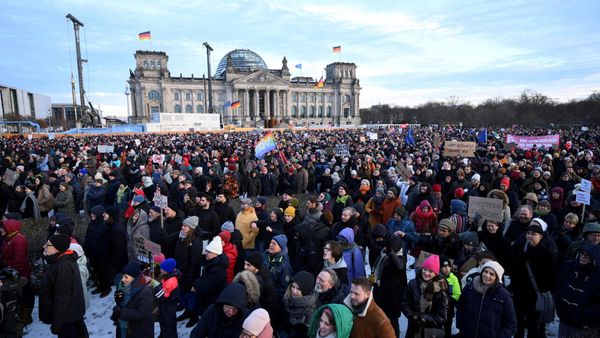Stocks ticked briefly higher late Wednesday before ending the session in the red and halting a two-day winning streak that marked the start of the quarter.
The Dow Jones Industrial Average ended down 42 points, or 0.14%, to 30,273, while the S&P 500 slipped 0.20% and the tech-heavy Nasdaq lost 0.25%.
The comeback follows Tuesday's surge when stocks leaped for a second day, with the Dow industrials up 825 points, or 2.8%, the S&P 500 tacking on 3.06% and Nasdaq surging 3.34%.
The major indexes had fallen in August and September amid sharp inflation and the Federal Reserve's determination to crush it with interest-rate increases.
Private sector employment increased by 208,000 jobs in September and annual pay was up 7.8% year-over-year, according to the ADP employment report.
"We are continuing to see steady job gains," Nela Richardson, chief economist, ADP, said in a statement. "While job stayers saw a pay increase, annual pay growth for job changers in September is down from August."
Peter Essele, head of portfolio management for Commonwealth Financial Network said “the increase in hiring is a rebound from August, but it’s still well below the average over the last year.”
“Combined with the rollover in the Jolts jobs numbers yesterday that indicated a slowdown in hiring, today’s release sheds light on a softening labor market that may spell trouble ahead for the economy,” Essele said. “As a result, investors should be wary of trying to capitalize on recent gains in the stock market, a likely scenario of picking of pennies in front of a steamroller.”
The yield on the two-year Treasury yield was up at 4.15%, while the benchmark 10-year Treasury was up at 3.749%.
Shares of Goldman Sachs (GS) and Morgan Stanley (MS) were both falling after both banks were downgraded by Atlantic Equities.
Analyst John Heagerty cited declining investment banking activity, falling equity markets and concern that trading estimates "remain too optimistic" as reasons for the downgrades.
Elon Musk, the billionaire CEO of electric-vehicle maker Tesla (TSLA) , put his offer for the microblogging website Twitter (TWTR) -- $54.20 a share, or $44 billion -- back on the table, according to a regulatory filing, TheStreet's Luc Olinga reported.
Musk had made the offer for Twitter on April 25 but withdrew it on July 8, saying the company had lied to him about the number of fake accounts on the platform.
Twitter filed suit, asking the Delaware Chancery Court to compel Musk to make good on his commitment. A five-day trial was supposed to start Oct. 17
Musk's bid is conditioned on Twitter dropping the lawsuit. Twitter shares closed on Tuesday at $52, 4% below Musk's offer price, and finished down 1.3% to $51.32, while Tesla closed down 3.5% to $240.81.
How to monetize Twitter will be one of Musk's knottiest efforts if and when he closes the deal.
Separately, Tesla said it would be using only cameras in the driver-assist functions of its electric cars, removing ultrasonic sensors from the vehicles.
Elecktrek reported that originally Tesla's driver-assist system encompassed eight cameras, a front-facing radar, and several ultrasonic sensors all around its vehicles.
OPEC+ agreed its deepest cuts to oil production since the 2020 COVID pandemic at a Vienna meeting on Wednesday, Reuters reported, curbing supply in an already tight market despite pressure from the United States and others to pump more,
OPEC+, which includes Saudi Arabia and Russia, agreed to cur production by 2 million barrels a day.
The cut in an already tight oil market could prompt a rise in oil prices, which in three months have fallen 25% to around $90 from $120. That decline came on the back of concerns that the global economy could fall into recession; interest-rate increases from the Federal Reserve, and a stronger dollar, Reuters reported. .
National Security Advisor Jake Sullivan and National Economic Council Director Brian Deese said in a joint statement that President Joe Biden "is disappointed by the shortsighted decision by OPEC+ to cut production quotas while the global economy is dealing with the continued negative impact of Putin’s invasion of Ukraine," according to CNN.
The administration will “consult with Congress on additional tools and authorities to reduce OPEC’s control over energy prices,” the statement read.
Brent crude prices were up $1.74 to $93.54, while WTI was up $1.36 to $87.88 late Wednesday afternoon.
“Although it’s reported that the Biden administration sought to dissuade Saudi Arabia – the de facto head of OPEC - - from cutting production, OPEC announced a 2 million barrels a day cut in oil production,” said Quincy Krosby, chief global strategist for LPL Financial. “This is less than what the market had predicted, and it’s possible that negotiations did have an effect on the final amount.”
Krosby said that it is not certain that all of the OPEC+ members have enough oil supply to draw down production.
“Still, an average cut with 2 million barrels a day should push gasoline prices higher,” he said, “but not at a pace that would bring back prices to the $5 a gallon that led to the Biden administration draining supplies from the Strategic Petroleum Reserve.”







